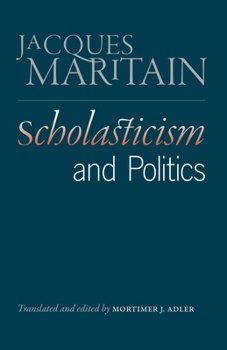Scholasticism and Politics
Select Format
Select Condition 
Book Overview
Scholasticism and Politics, first published in 1940, is a collection of nine lectures Maritain delivered at the University of Chicago in 1938. Maritain championed the cause of what he called personalist democracy--a regime committed to popular sovereignty, constitutionalism, limited government, and individual freedom. He believed a personalist democracy offered the modern world the possibility of a political order most in keeping...
Format:Paperback
Language:English
ISBN:086597828X
ISBN13:9780865978287
Release Date:October 2011
Publisher:Liberty Fund
Length:248 Pages
Weight:0.85 lbs.
Dimensions:0.8" x 5.5" x 8.5"
Age Range:18 to 10 years
Grade Range:Postsecondary to Grade 5
Customer Reviews
1 rating
A Reasoned Attempt to Mitigate Impending Tragedy
Published by Thriftbooks.com User , 15 years ago
The late Thomist philosopher Jacques Martitain (1882-1973)was a neo-Scholastic thinker who converted to Catholicism in 1906. His book titled SCHOLASTCISISM AND POLITICS was published in 1940 just after W.W. II started and before this war became a global tragedy. Maritain offered possible solutions to the tragic events in 1940, but he accurately predicted the future of Europe would get worse before it ever improved. Martian analyised the rise of Italian Fascism, German National Socialism, the Soviet Worker's "Paradise." Maritain knew that totalitarianims was "the order of the day," but he accurately predicted that totalitarianism under whatever political label would not last in spite of the prevailing view to the contrary. He also made interesting observations and criticisms of Logical Positivism and what Maritain called the philosophy of Fruedianism. Maritain argued that the police state apparatus under totaltitarianism was "unnatural." He considered the ideas of German National Socialism regarding the "Volk" would lead to what he called a "biological inferno." Maritian was critical of the Soviet system and the ideology of Marsixm and Big Communism. Maritain stated that excessive concern of materialism would lead to a political and social system that was oppressive and lethal to those who were ruled in such a system. Material equality meant that no one was happy. Maritain made an interesting disctinction between authority and power. Maritian stated that authority came from wisdom, knowledge, character, an honorable moral code, etc. Those who held such authoritiy and should have power if only because they could exercise politcal power wisely and justly. Power without just authority led to tyranny which Maritian, in accordance with St. Thomas Aquinas (1275-1274)said was unjust. In fact St. Thomas Aquinas stated that an unjust law was no law at all as such a law lead men to do evil in spite of "God's Will." However, Martain, in accordance with St. Thomas Aquinas comments re tyranny, stated that rebellion and revolution could lead to worse tyranny which modern revolutions have vindicated. Maritain also diagnosed Rousseau's (1712-1778)political thinking very effectively. Maritian critisized Rousseau's concept of "The General Will" due to the fact that such a concept could lead to more intolerant tyranny "in the name of the people." One could ask whose General Will. Maritain raised the question of how those in power were so smart as to know the General Will. Maritain stated that such a system based on "The General Will" would lead to the more oppressive tyranny than that which previously existed. One can understand that 20th. century totalitarian rulers and party leaders ruled in the "Name of the People," and political dissents were crimes "Against the People." One can read Henrik Ibsen's (1828-1906)play titled AN ENEMY OF THE PEOPLE to grasp this phenomena. Maritain also did a good job in his treatment of Proudhon's (1809-1865)views of anar




